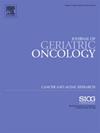基于德尔菲共识,法国老年肿瘤学会(SoFOG)发布了优化接受系统性癌症治疗的老年患者ePROs监测的指南
IF 2.7
3区 医学
Q3 GERIATRICS & GERONTOLOGY
引用次数: 0
摘要
电子患者报告结果(ePRO)监测提高了癌症治疗的完成率和生活质量(QoL),目前已被几个法国国家健康保险覆盖。鉴于全世界大多数被诊断为癌症的患者年龄在65岁或以上,我们需要考虑患者潜在的虚弱(例如,活动能力和跌倒史、合并症、多种药物、认知障碍)及其对癌症治疗结果的负面影响。本研究的目的是提出建议,以优化老年癌症患者的ePRO监测。材料和方法采用全国德尔菲法,针对年龄≥65岁的癌症患者和/或其主要照顾者,以及使用为肿瘤学开发的ePROs的医疗保健专业人员(医生、护士、药剂师)。根据患者概况、易用性、实用性和满意度,利用国家和国际指南以及科学文献,制定了10项建议。每个参与者使用李克特量表对每个建议的同意程度进行投票。建议可以在每一轮反馈之后进行修改,以更好地反映老年人对ePROs的需求。结果在第一轮221名受试者和第二轮148名受试者中,年龄≥65岁的受试者占绝大多数(分别为94.1%和94.6%),超过90%的受试者为患者(分别为91%和93.2%)。第一轮和第二轮均以男性为主(分别为59.3%和62.2%)。在提出的10项建议中,3项达成了强烈的一致意见,6项达成了温和的一致意见。关于使远程监测适应年龄阈值的建议没有达成共识。由于大多数参与者是老年患者,这一共识强调了他们在ePRO优化方面的需求。我们的指南共提出了九项建议,以纳入ePRO监测系统。本文章由计算机程序翻译,如有差异,请以英文原文为准。
Guidelines to optimise ePROs monitoring for older patients under systemic cancer treatment from the French Society of Geriatric oncology (SoFOG) based on a delphi consensus
Introduction
Electronic patient-reported outcome (ePRO) monitoring improves cancer treatment completion, quality of life (QoL), and is now covered by several French National Health Insurances. Given that most patients diagnosed with cancer worldwide are aged 65 or over, we need to take into account patients' potential frailty (e.g., mobility and history of falls, comorbidities, polypharmacy, cognitive impairment) and its negative impact on cancer treatment outcomes. The aim of this study was to make recommendations to optimise ePRO monitoring in older patients treated for cancer.
Materials and Methods
This national Delphi method targeted patients with cancer aged ≥65 and/or their primary caregivers, as well as healthcare professionals (doctors, nurses, pharmacists) using ePROs developed for oncology. Ten recommendations were developed – using national and international guidelines as well as scientific literature – based on patients' profiles, ease of use, usefulness and satisfaction. The level of agreement with each recommendation was voted by each participant using a Likert scale. Recommendations could be modified after each round based on feedback to better reflect the needs regarding ePROs for older adults.
Results
Among the 221 participants at the first and the 148 at the second round, the majority of participants were aged ≥65 (94.1 % and 94.6 % respectively) and over 90 % of participants were patients (91 % and 93.2 % respectively). Males were predominant in both the first and second round (59.3 % and 62.2 % respectively). Of the 10 proposed recommendations, three reached a strong agreement and six a moderate agreement. There was no consensus on the recommendation to adapt telemonitoring to an age threshold.
Discussion
As most of the participants were older patients, this consensus highlights their needs in terms of ePRO optimisation. Our guidelines propose a total of nine recommendations to be integrated by the ePRO monitoring systems.
求助全文
通过发布文献求助,成功后即可免费获取论文全文。
去求助
来源期刊

Journal of geriatric oncology
ONCOLOGY-GERIATRICS & GERONTOLOGY
CiteScore
5.30
自引率
10.00%
发文量
379
审稿时长
80 days
期刊介绍:
The Journal of Geriatric Oncology is an international, multidisciplinary journal which is focused on advancing research in the treatment and survivorship issues of older adults with cancer, as well as literature relevant to education and policy development in geriatric oncology.
The journal welcomes the submission of manuscripts in the following categories:
• Original research articles
• Review articles
• Clinical trials
• Education and training articles
• Short communications
• Perspectives
• Meeting reports
• Letters to the Editor.
 求助内容:
求助内容: 应助结果提醒方式:
应助结果提醒方式:


